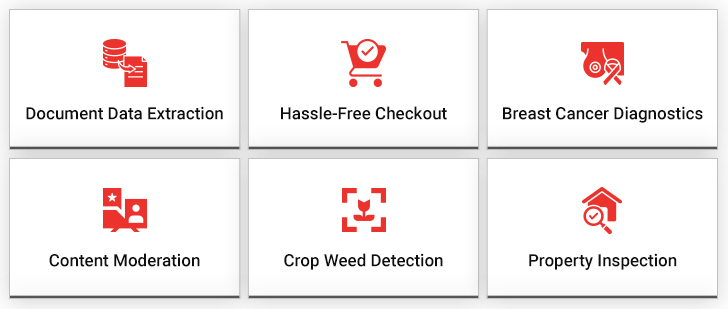Without trying to sound too alarmist, technology adoption will be one of the deciding factors for the survival of businesses in the coming times. Covid-19 and the accompanying disruption have highlighted the importance of future-proofing businesses with the adoption of technology and digital strategies. According to a Gartner poll, AI came to the rescue of businesses during the pandemic. It states that “despite the global impact of COVID-19, 47% of artificial intelligence (AI) investments were unchanged since the start of the pandemic and 30% of organizations actually planned to increase such investments.”
Machine learning applications powered by AI data labeling guided businesses to adapt to the continuous market disruptions. While some companies could achieve resilience by transforming according to the given speed of technological evolution, those who couldn’t adapt to the ‘new normal’ had to put down the shutters permanently. The adoption of next-gen technologies such as robotic process automation (RPA), artificial intelligence (AI), machine learning (ML), etc., thus, kept the lights ON for the organizations.
Empowering AI and ML
AI and ML have the potential to redefine business modules across industries. But a question worth contemplating here is what empowers these machines to make decisions? The answer is the AI data labeling process. Just like humans act and learn from experience, machines learn from data to make decisions, identify patterns, and act in favor. Supervised training is required for machines to evolve and grow, thus the need for data labeling for machine learning is worth understanding.
Industry Use Cases
Once a subject of imagination and the main plot of science fiction movies for ages, AI and ML are now a marvelous reality. From our window, we see AI and ML making their way into the organizations and gradually becoming the next frontier in revolutionizing core business processes including customer experience. These new-age technologies have immense potential in enhancing the bottom-line efficiency of the company and generating greater revenue.
Higher intelligence demonstrated by the machines has led to applications across a range of industries and verticals including banking, finance, insurance, eCommerce, retail, healthcare, life sciences, agriculture, and so on. The strategic combination of AI and ML in the form of computer vision models, conversational interfaces, etc., is impacting fields as diverse as medical diagnosis, human communications, autonomous vehicles, fraud detection, and much more. Let’s take a closer look at some of the use cases highlighting how ML drives value to businesses:
1. Document Data Extraction
Businesses can save significant amounts of time and money spent in assessing heaps of incoming paper documents by automating their data extraction process. With Intelligent Document Processing Solutions – powered by AI, they can augment traditional processes including manual data entry, data scanning via optical character recognition technology, data collection, etc., that are tedious and error prone. Investing in computer vision-based models that are customized to automate the data extraction process is, thus, a smart way out!
2. Hassle-Free Checkout
Customers are embracing the convenient and quick in-store cashier checkout experiences. It also reduces transaction times and operational costs for retail businesses. The in-store experience is transformed using scanners, sensors, mobile devices, cameras, etc. Leveraging computer vision models powered by AI data labeling inputs to identify and count products on the checkout counter provides a seamless user experience.
3. Breast Cancer Diagnostics
A breast cancer diagnosis is a time-consuming process that involves numerous tests and other processes. The images of tissues are analyzed by computer vision-based models to predict which lesions might become cancerous. Leveraging this approach helps reduce the specialist’s workload in a typical pathology lab, thereby revolutionizing healthcare. It also facilitates early breast cancer detection; early cancer detection increases the chances of successful treatment. The experienced AI data labeling companies can create repositories of quality-labeled medical images at speed for training AI algorithms by following best practices of AI data annotation, thus accelerating the medical labeling for Diagnostic AI.
4. Content Moderation
Protecting a brand’s online presence is essential for businesses, regardless of the industries they deal in since consumer trust and experience are paramount. The experienced AI data labeling companies leverage deep learning techniques to accurately moderate content at scale in real-time—whether it’s filtering undesirable text and profanity, detecting unwanted and offensive images, or weaponization.
5. Crop Weed Detection
Over the recent years, weeds have been largely responsible for huge agricultural losses. But with advances in AI and ML, automatic weed detection becomes possible to minimize the nearby plant loss. Selective weed treatment done via unmanned aerial vehicles (UAVs) becomes an important step in autonomous crop management to check crop health and yield by obtaining the images of the entire agricultural field with a very high spatial resolution and at a low cost. The UAVs leverage convolutional neural networks (CNNs) and AI data labeling for weed detection from the images.
6. Property Inspection
Overall, outdoor home inspection including roof, terrace, etc., is a costly and time-consuming process. Thanks to the AI data labeling process, companies can build computer vision-based models to understand the structure quality of almost any address on the planet. Likewise, checking whether a product is built per specifications during bulk operations is a taxing job and is very much prone to human fallibility. Thus, factories are employing machine learning models and using data labeling and annotation services to scan imperfections that the human eye might miss.
Way Forward
Going forward, it is essential that companies leverage the best AI practices to accelerate their core business processes at speed and scale. Engaging in data labeling services is, therefore, a better alternative to fuel the smart models. The professionals follow the best practices around data processing, ground truth, training, and quality coupled with emerging trends, thereby reducing the associated burden of labeling volumes of complex data.
To close with, I would quote Satya Nadela, Microsoft CEO, “AI and other digital technologies have ensured productivity and mission-critical activities during the pandemic …Digital transformation will no longer be an optional topic in boardrooms. That is the kind of structural change we are seeing.” Businesses are more reliant on digital strategies than ever and it’s time to let the professionals take you through this transformation for good!







